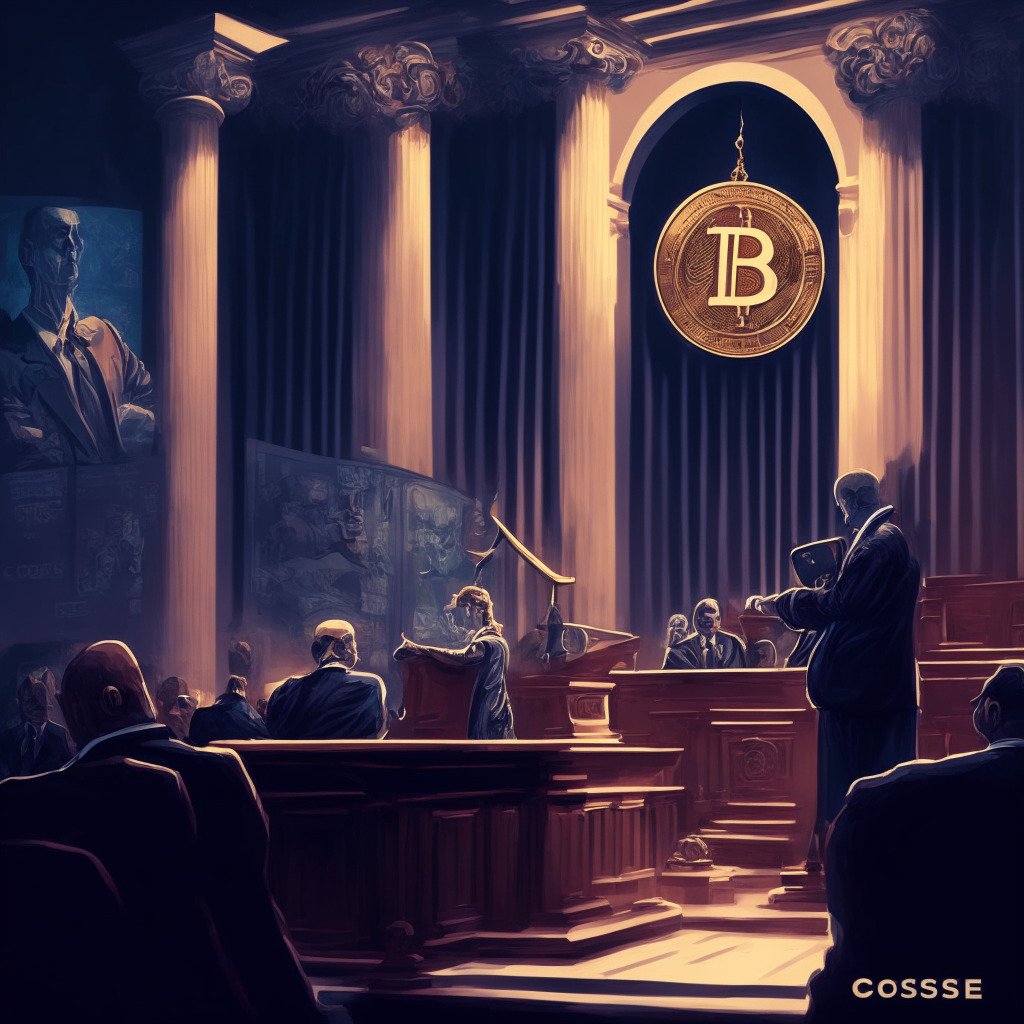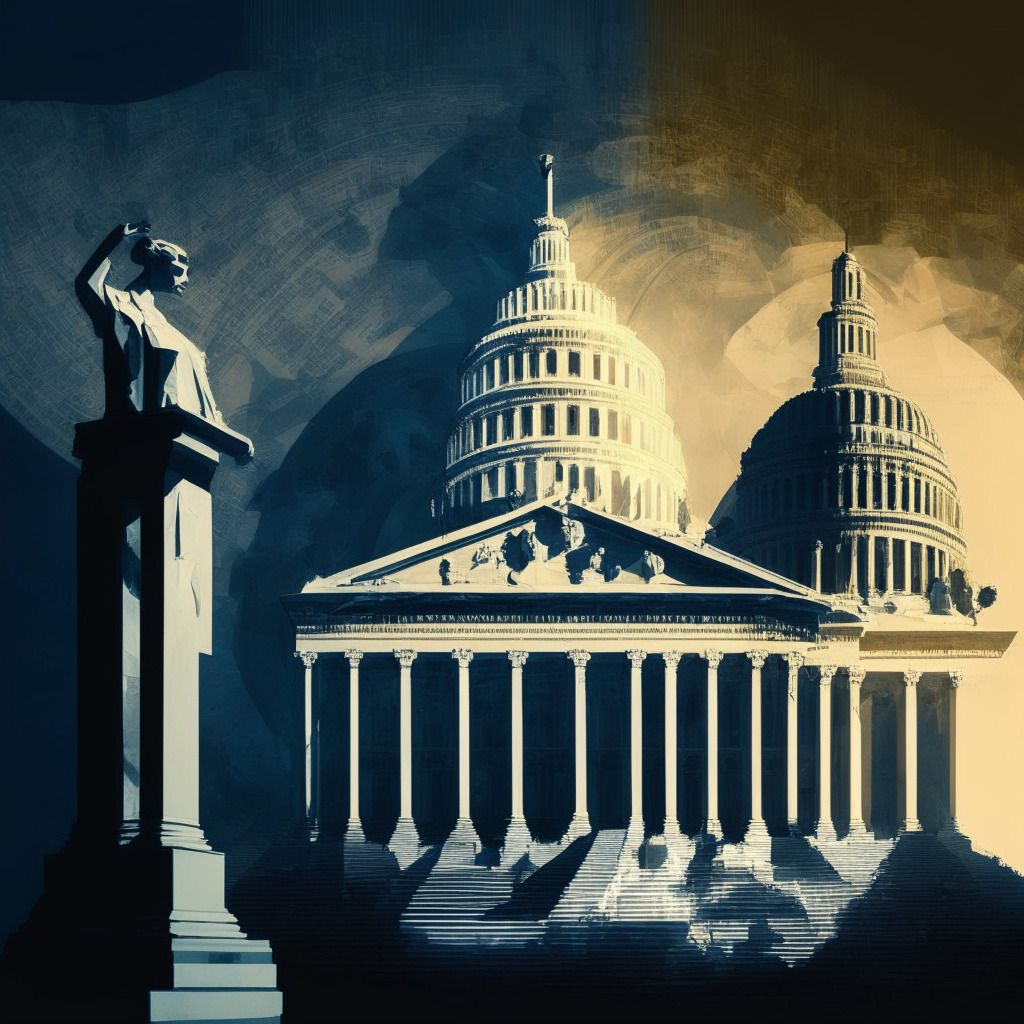Three
Search Results for: U.S. House of Representatives
Darknet Task Force: Balancing Crypto Crime Fight and Blockchain Innovation
The Department of Homeland Security has formed the “Darknet Marketplace and Digital Currency Crimes Task Force,” an interagency group aimed at investigating crypto and darknet crimes and increasing collaboration. The Task Force will play a crucial role in mitigating criminal activity impact while balancing regulation and innovation in the evolving crypto industry.
Biden’s AI Summit: Balancing Innovation, Regulation, and Blockchain Implications
President Joe Biden is set to meet with AI experts to discuss the future of artificial intelligence and the need for legislation and guidelines. This comes at a time when the U.S. government has yet to establish a comprehensive strategy for AI development and cryptocurrency regulation, while Europe, China, and the United Kingdom have already made progress in these areas. The meeting aims to address concerns on policy, regulation, and balancing innovation with safety and risk mitigation.
SEC Stabilization Act vs Gensler’s Future: Analyzing Impacts on Crypto Markets and ETFs
The SEC Stabilization Act seeks to fire SEC Chair Gary Gensler and redistribute power within the agency, while BlackRock applies for the first spot Bitcoin ETF in the U.S. Amidst these developments, the crypto market continues to evolve and face uncertainties, highlighting the importance of staying informed.
Urgent Need for Crypto Regulations: Debating the Pros, Cons, and Conflicts
A Congressional hearing discussed the Digital Asset Market Structure Discussion Draft, aiming to establish a regulatory framework for digital assets. The industry seeks regulatory clarity amid concerns that insufficient action could have “devastating consequences” for the U.S.’s global digital economy competitiveness.
Crypto Volatility Persists: FOMC Pause, SEC Charges, and Future Rate Hikes
The crypto market remains volatile following the June 14 FOMC announcement pausing rate hikes, affecting Bitcoin price. Muted crypto price action potentially reflects lingering effects of SEC charges against Binance and Coinbase. While interest rate hikes are paused, regulation remains a major threat, with SEC enforcement actions increasing and investor sentiment remaining low.
SEC’s Proposal Sparks Debate: Overreach, Blockchain Future, and Freedom of Speech Concerns
The SEC extended the comments period for amending Rule 3b-16, facing criticism from the Blockchain Association and Republican committee members for its potential negative impact on the crypto industry. Opponents argue that the proposal’s broad language could capture a wide range of individuals, exceeding the agency’s authority and raising constitutional concerns.
The Battle to Remove SEC’s Gensler: Legal Complexities and Crypto Community Backlash
U.S. lawmakers introduced the SEC Stabilization Act, intending to fire SEC Chair Gary Gensler over allegations of misconduct and abuse of power. However, removing an independent agency official is legally complex, involving criteria like inefficiency, neglect of duty, or malfeasance. The act could restructure the SEC and shift authority among commissioners.
Will Democrats Lose Young Crypto Voters? Analyzing the Winklevoss Claims and the Political Divide
The Winklevoss twins suggest that the Democratic Party’s perceived “war on crypto” could cost them key young voters in upcoming elections. Young people, who largely supported Democrats previously, make up a significant portion of cryptocurrency adopters. It remains uncertain how important crypto policy is to young voters compared to other issues.
SEC vs Coinbase and the Battle for Crypto Regulation in the US: Moral Authority Overreach?
The SEC, led by Gary Gensler, recently filed charges against Coinbase, citing existing U.S. laws to regulate cryptocurrencies. However, ongoing bills in Congress, such as the Digital Asset Market Structure and Investor Protection Act, could undermine these actions and demonstrate Gensler’s potential overreach.
AI, Copyright Infringement, and the Battle for Regulation: Analyzing Japan’s Legal Gray Area
Japanese AI experts raise concerns over lack of regulation for AI training using copyrighted material, leading to potential copyright infringement cases. Lawmakers and regulators need to establish guidelines and legislation to address these concerns as the AI industry continues to evolve.
Debt Ceiling Uncertainty: Top Cryptos to Buy Amid Market Turmoil and Interest Rate Hikes
The cryptocurrency market faces uncertainty due to the U.S. debt ceiling vote and potential interest rate hikes, causing downturns in leading cryptocurrencies like Bitcoin and Ethereum. Investors are cautious and await the May U.S. jobs report for economic insight.
Surge in Republican Opposition to CBDCs: Privacy Concerns vs Financial Inclusion Benefits
Recent opposition from Republican lawmakers to a central bank digital currency (CBDC) raises concerns over government surveillance and privacy threats, as they argue a digital dollar could grant federal officials unprecedented access to individuals’ financial data. The future of the Federal Reserve’s potential pilot program remains uncertain amid intensified debate surrounding CBDCs.
Crypto Miners Dodge Tax Bullet in US Debt Ceiling Deal: Pros, Cons, and Main Conflict
The latest U.S. debt ceiling bill draft potentially eliminates a proposed 30% tax on electricity used by cryptocurrency miners, as part of President Biden’s FY2024 budget. The legislation, aiming to prevent a government debt default, still needs congressional approval.
Biden-McCarthy Debt Ceiling Talks Impact Crypto Market: Uncertainty and Its Consequences
A delay in pivotal discussions between U.S. President Joe Biden and House of Representatives Republicans has left the financial market, including the crypto market, feeling uncertain. The 24-hour crypto trading volume decreased by 23% as participants await clarity on raising the federal $31.4 trillion debt ceiling.
Biden’s Proposed 30% Bitcoin Mining Tax: Impact on National Security and Clean Energy
Sen. Cynthia Lummis addressed concerns over President Biden’s proposed 30% excise tax on Bitcoin miners, stating it could negatively impact both Bitcoin mining and national security. Although lawmakers remain skeptical due to criminal activity associations, Lummis emphasizes the importance of promoting Bitcoin mining in the US for energy security and potential environmental advantages.
Stablecoin Regulation Debate: Balancing State vs. Federal Control for Innovation & Security
The House Committee on Financial Services’ new Subcommittee on Digital Assets, Financial Technology, and Inclusion debated two proposed bills for stablecoin regulation, highlighting the need for a balance between state and federal control. The ongoing discussion emphasizes finding a suitable middle ground that fosters innovation and guarantees stakeholders’ best interests.
Major Questions Doctrine: Friend or Foe in Crypto Regulation Battle?
The major questions doctrine, a legal principle in U.S. administrative law, could potentially diminish the SEC’s authority in regulating the cryptocurrency industry. Kraken’s Chief Legal Officer, Marco Santori, believes this concept is relevant as lawmakers deliberate on cryptocurrency regulations and should be considered by the SEC and CFTC.
Biden’s Federal Reserve Nominations: How They Could Shape the US Crypto Future and CBDC Debate
President Joe Biden nominates economist Philip Jefferson and former chief economist Adriana Kugler for critical roles in the Federal Reserve, impacting the U.S. government’s approach to cryptocurrencies, blockchain technology, and the potential introduction of a central bank digital currency (CBDC).
Overstepping Boundaries? SEC’s RIA Rule Impact on Crypto, Banks, and Non-Traditional Assets
The U.S. House Financial Services Committee and crypto community criticize the SEC’s proposed advisory clients custody rule, arguing it oversteps authority and affects the banking and digital asset industries negatively. The rule could impose burdensome regulations on banks and hinder digital assets’ growth and innovation, necessitating a reconsideration of the proposal.
SEC & Congress Clash: Crypto Platforms Registration, Balancing Regulation & Innovation
The SEC faces challenges in crafting digital asset regulations that protect investors without stifling innovation. Lawmakers express frustration over the regulatory body’s lack of clarity, while the future role of the SEC and Congress in shaping crypto regulations remains uncertain.
Florida’s Anti-CBDC Law: Protecting Privacy or Hindering Progress? Debating Pros and Cons
Florida’s anti-CBDC legislation, SB 7054, explicitly prohibits the use of central bank digital currencies as a digital medium of exchange, aiming to protect Floridians’ financial privacy. Set to come into effect on July 1, 2023, this legislation highlights growing concerns over potential privacy and political repercussions linked to CBDCs.





















